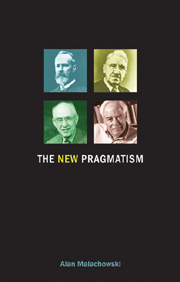Book contents
- Frontmatter
- Contents
- Preface
- Acknowledgements
- Abbreviations
- 1 Introducing the New Pragmatism
- 2 Leaving classic pragmatism behind
- 3 Rorty against the tradition
- 4 Putnam's contributions
- 5 Putnam and Rorty: pragmatism without reconciliation
- 6 Prospects
- Conclusion: the New Pragmatism and philosophy
- Notes
- Reading the New Pragmatists
- Bibliography
- Index
Conclusion: the New Pragmatism and philosophy
- Frontmatter
- Contents
- Preface
- Acknowledgements
- Abbreviations
- 1 Introducing the New Pragmatism
- 2 Leaving classic pragmatism behind
- 3 Rorty against the tradition
- 4 Putnam's contributions
- 5 Putnam and Rorty: pragmatism without reconciliation
- 6 Prospects
- Conclusion: the New Pragmatism and philosophy
- Notes
- Reading the New Pragmatists
- Bibliography
- Index
Summary
It is pictures rather than propositions, metaphors rather than statements, which determine most of our philosophical convictions.
(Richard Rorty, Philosophy and the Mirror of Nature)We have said that the New Pragmatism needs to capitalize on its influence outside the field of philosophy itself. And, we have shown some of the ways in which it has started to do so with enthusiasm and evident accomplishment. Does this mean that it cannot flourish within that field? This question needs to be split up. We did not intend to imply that the New Pragmatism cannot do well within philosophy. Our claim simply acknowledged that it would prefer to do well by its own standards. And there is more social utility to be had, and more scope for practical efficacy, if the New Pragmatism widens its sphere of application. But, this still leaves untouched the question: can the New Pragmatism do well within philosophy? What is there to say about it?
Well, that question breaks down into the question of whether the New Pragmatism is likely to succeed and a question about ‘possibility’: can it do so or is there good reason to think that philosophical success is impossible? The first question is pretty straightforwardly factual, and the answer depends on many contingent circumstances and events that are difficult to predict.
- Type
- Chapter
- Information
- The New Pragmatism , pp. 129 - 136Publisher: Acumen PublishingPrint publication year: 2009

